Bill Moser's Story ... By his sister Mary Lou Moser Hall
It has been 62 years since William T. Moser was killed by a bomb hitting the bridge that his company was building. We, his siblings, have reconstructed his life from our memories. As his youngest sister who was two years old at the time of his death, my contribution has been to collect the stories from my brothers and sister. So what you read will come from Beverly Coe Moser who was seven years younger than Bill, Robert Louis Moser nine years his junior and Elizabeth Ann Kirkman who was only nine in 1944.
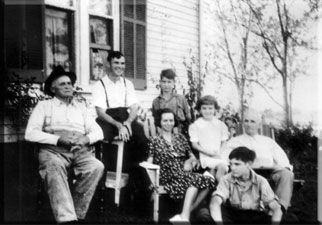
the Moser family back in 1941 ...
What we have learned is that Bill lived his 24 years of life to the fullest. In that short time, he had married twice and
fathered two children. He had saved some people from possible drowning. He had known joy and heartache and given some of the
same.
I am grateful that the story of his short life can live on in this manner...
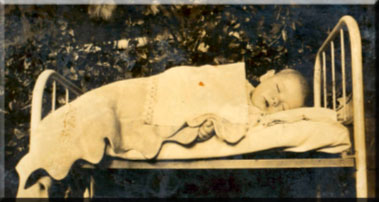 Billy Moser asleep in his earliest years ...
Billy Moser asleep in his earliest years ...Beverly Coe Moser's Memories of his Brother Bill ...
William was called Bill by the family. He was the Moser's first child. He was also the Trunnell's first grandchild. Our
mother's parents Thomas and Louise Trunnell lived only two doors away. It is told that Bill was doted upon by them and his
maiden aunt, Frances. Bill attended grade school in Bardstown Junction and High School in Shepherdsville, KY. His mother
always bragged about how smart he was. He wrote poetry and sent her letters from Europe with poetry enclosed. Unfortunately
none of those poems have survived.
Bill and Daddy (Coe H Moser) built a boat because the water was rising across the street from their home and the barn where
they kept the cows was on a hill beyond the water. It was a very fortunate thing that they had done so. You will hear in
Bob's Memories about how Bill used it to rescue many people from the rapidly rising flood waters in 1937.
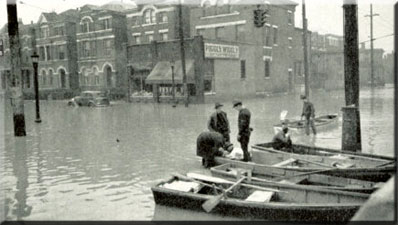 the Flood of 1937 (picture shows Louisville, KY)
the Flood of 1937 (picture shows Louisville, KY)The generator that powered the refrigerator and some of the lights in our home was in the cellar. It consisted of six glass jars with plates and acid. They were stored on two shelves. The cellar had an outside entrance with steps. Our mother (Mary Jane Trunnell Moser) saw that the water was causing the doors to bulge and coming in around them. Indeed the water was knee to waist deep in the cellar. The generator needed to be turned off. So she tied a rope around Bill's waist and gave him a wooden stick, maybe a broom stick, and sent him down to turn it off. If the door burst and the water swept in she could pull him out.
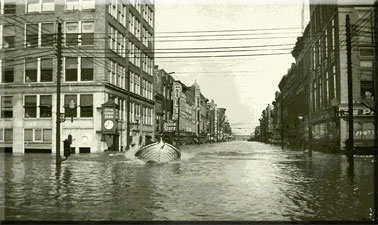 a boat in the streets during the Flood of 1937
a boat in the streets during the Flood of 1937When the flood waters receded, there was a terrible mess to clean up. In the garage they had stored feed for the chickens and oil along with some others things. As the water rose they mixed into a sticky batter and as it receded the mix coated the car entirely. Bill rebuilt the car that had been covered by water for 10 days. He tore down the engine and baked many of the electrical parts in the oven to dry them. When reassembled, it ran!
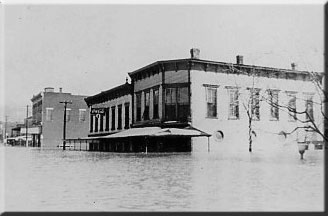 the Flood of 1937 takes over !
the Flood of 1937 takes over !
Stories are told that Bill had some rebellious teen behaviors. For example he backed that car that he had rebuilt through
the garage doors and went to his father's parent's house in Stanford, Kentucky once because he had been grounded.
At age 18 he married Beulah Welker, age 15. They lived with our family in Bardstown Junction at least some of the time. She
became pregnant, delivered a baby girl and died a few days later. Our parents didn't feel that they could raise the child.
She was adopted by an aunt and uncle of Beulah's. She was named Mary Ann Roberts. Mary Ann now has several children and
grandchildren.
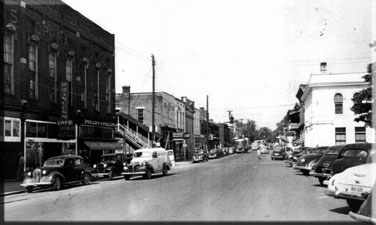 Main street Sranford, Kentucky
Main street Sranford, KentuckySoon thereafter, about 1940, Daddy was transferred and our family moved to Elizabethtown, Kentucky. Bill worked as an electrician at Fort Knox. It was about this time that he met and married his second wife, Irene. His son William T Moser, Jr. was born in 1943. He has been told that his father saw him once at age 3 months.
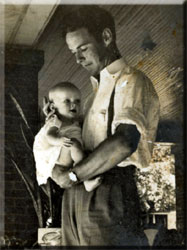 Bill with his son William T Moser Jr.
Bill with his son William T Moser Jr.Robert Louis Moser' Memories of his brother Bill ...
My oldest brother Bill who was born April, 1920. It was the fall of 1937 and Bill was seventeen years old. The rain had come
down for days without interruption. My father and mother were concerned about the rising water. We lived in a small town in
Kentucky, near Long Lick Creek and not far from the Salt River. The ground was soaked with water and all the additional rain
water had to run off. The creek was already out of its banks and had been running strong. Now it was starting to overflow
because the Salt River was backed up from the Ohio River.
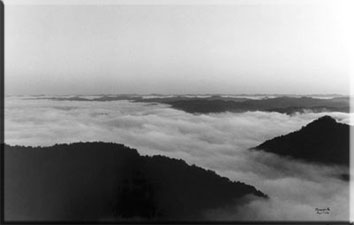 the Kentucky Salt River Basin
the Kentucky Salt River BasinAs my brother told you, Dad and Bill went over to the barn and got some new barn boards and knocked together a row boat or skiff. The boat had a front, middle, and rear seats. Oar locks for rowing and nothing else.
Dad was working the 11pm to 7am shift at the Strawberry Yards of the Louisville and Nashville Railroad. He rode the train to work in Louisville and back. He was at work one night when my mother was awakened. About 2am she woke Bill up telling him she heard people crying for help.
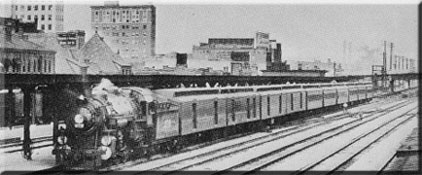 "He rode the train to work in Louisville and back"
"He rode the train to work in Louisville and back"Bill bailed the water out of the boat and rowed down toward the creek where he heard the calls for help. It was the Hoagland family on the roof of their house. He took them to high ground near the Wathen House. Next he went to the Mc Callister place where he got three more people out of the upstairs window. He rowed them to the same place on the driveway of the Wathen house. Other people were now aware of the situation. They were there to help by driving these refugees out of the rain and on to the house.
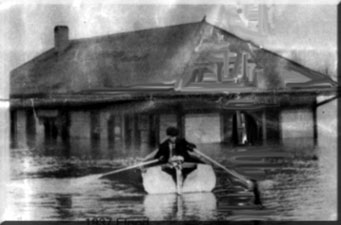 the row boat Bill and his dad knocked together ...
the row boat Bill and his dad knocked together ...The next trip he got the two Mooney "girls" from their house. They were very large and insisted on having a big comforter wrapped around them. They both sat on the rear seat and the boat was about to dip water. Every time they shifted around the boat took on water. Bill would stop rowing and bail out the water. He was tired, wet and angry. The third time this happened he indicated an oar and said, "The next time one of you moves and makes the boat dip water, I will take this oar and knock you out of my boat! Do you understand me?" He told us later that he didn't think they breathed after that.
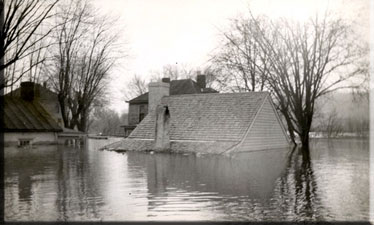
many homes were flooded ...
Bill was out all that morning rowing people out of the flood waters. By this time the water was all around our house. Mom was also up and trying to get everything she could upstairs out of the reach of the flood waters. My other brother who was ten and myself, age eight, were helping carry everything that we could upstairs. We made trip after trip up the stairs with drawers and anything that my mother thought we could carry. Then we took the bedroom furniture apart and carried it up a piece at a time. (We still have that bedroom suit in our home.)
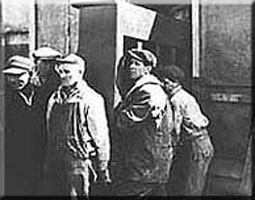
trying to rescue everything ...
As the water rose higher we could hear the fruit jars in the cellar bumping against the floor.
Dad could not get home because of the water over the tracks. He borrowed a mule from a neighbor and rode around the hill
tops to come in the back way. When he got to the Wathen house he found his eldest son, Bill, wet, tired and hungry but
proud of the people he had saved that morning.
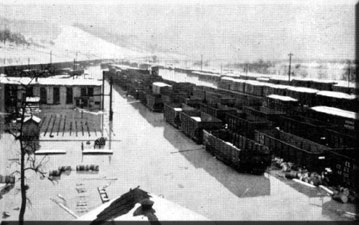
"Dad could not get home because of the water over the tracks"
Elizabeth Ann Moser Kirkman's Memories of her brother Bill ...
I only recall that I visited my brother and his young bride (first wife) at their rented apartment at a large home (the
Wathen's) adjacent to our parent's home in Bardstown Junction, KY. His wives were both lovely young women. Beulah was as
dark haired and beautiful as his second wife, Irene, was fair and red haired. I have only one snapshot of Bill. I've always
thought he was "movie star handsome" and very "macho".
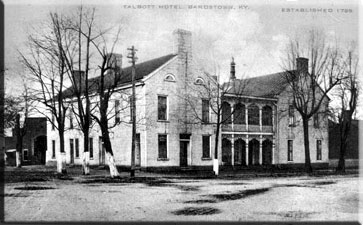
the Talbott Hotel in Bardstown, KY
My strongest memory was the utter devastation his death dealt our mother. Looking back, I think she suffered from guilt that she did not try to raise his motherless first child; though it was certain that Mary Ann was adored by her adoptive parents and enjoyed many benefits of their largesse. Mary Ann married an engineer who traveled extensively and though our family kept up with her whereabouts for years, she eventually became lost to us.
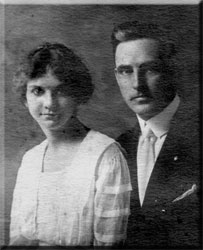 Bill's parents
Bill's parents
I was interested to hear that our elder brother remembers that Bill was a poet. Our mother also told me that and that he had
musical talent, though I have no particulars. Perhaps he played the violin, as did our mother.
It is sad that so many young men died all too young for "wars that were to end war". Unfortunately, that seems never to
change.
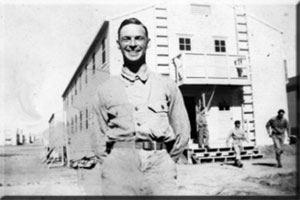
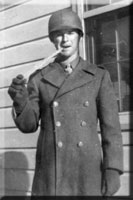
Bill in training in the United States
Bill served with his unit of Combat Engineers to the
European theater. He was killed while rebuilding a bridge. Our mother sought more information about the particulars of his
death but found out very little. This newspaper article was published a few days after his parents heard of the death of
their oldest son, Bill ...
the newspaper article reads ...
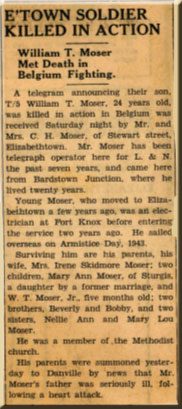
"A telegram announcing their son T/5 William T Moser, 24 years old was killed in action in Belgium was received Saturday
night by Mr. and Mrs. C.H. Moser of Stewart Street, Elizabethtown. Mr. Moser has been telegraph operator here for L & N
the past seven years, and came here from Bardstown Junction where he lived twenty years.
Young Moser, who moved to
Elizabethtown a few years ago, was an electrician at Fort Knox before entering the service two years ago. He sailed overseas
on Armistice Day, 1943.
Surviving him are his parents, his wife, Mrs. Irene Skidmore Moser; two children, Mary Ann Moser.
Of Sturgis a daughter by a former marriage, and William T Moser Jr., 5 months old; two brothers, Beverly and Bobby, and two
sisters Betty Ann and Mary Lou Moser. He was a member of the Methodist Church.
His parents were summoned yesterday to
Danville by news that Mr. Moser's father was seriously ill, following a heart attack."
Bill Moser was killed in action September 10, 1944. This date
was only days before the 1st US Army liberated the area where Henri-Chapelle cemetery is situated today.
On September 28,
1944 a temporary cemetery was established near the current place of Henri-Chapelle cemetery. Bill Moser most probably found
his initial resting place on the temporary cemetery of Foy, near Bastogne. Together with 7.991 other American soldiers,
sailors and airmen, Bill found his final resting place in Henri-Chapelle cemetery ... According to the time and date of his
death and the position of the 1st US Army at that time, Bill must have been killed very close to the current site of the
Henri-Chapelle cemetery ...
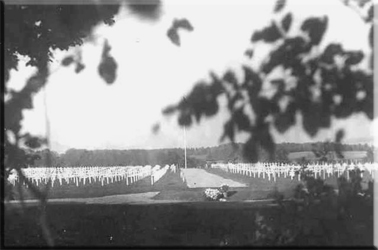
the Temporary US Cemetery at Foy (Belgium)
As stated above, Bill Moser rests in the beautiful American Military Cemetery at Henri-Chapelle ... He is remembered and honored by his sisters Mary Lou Moser Hall & Elizabeth Ann Moser Kirkmann, by his brothers Beverly Coe Moser & Robert Louis Moser, by his entire family, by the members of the 237th Engineer Combat Battalion Association, by every visitor of the Henri-Chapelle cemetery and by each and every visitor of the In Honored Glory website.
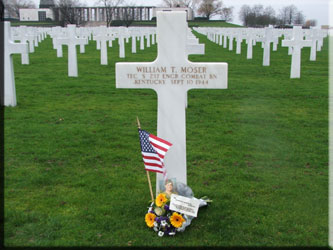 Tec 5 William T Moser's final resting place at Henri-Chapelle cemetery.
Tec 5 William T Moser's final resting place at Henri-Chapelle cemetery.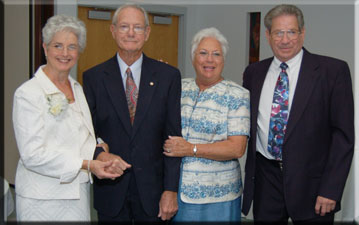 Bill's brothers and sisters these days ...
Bill's brothers and sisters these days ...From left to right Mary Lou Moser Hall, Beverly Coe Moser,
Elizabeth Ann Moser Kirkman and Robert Louis Moser.
published January 1, 2007